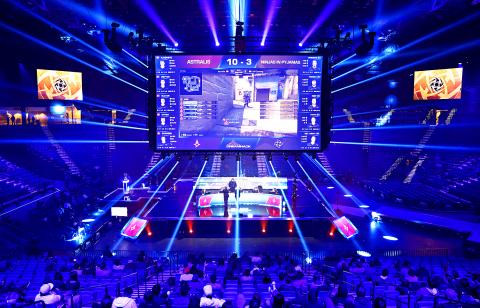The arena has all the features that a professional sports venue needs: stands, warm-up areas for teams, massive screens for spectators and a broadcast platform for commentators. What distinguishes this new Las Vegas arena is its dozens of video game consoles.
The approximately 1,400m2 e-sports venue scheduled to open on Friday will host competitive video game tournaments.
It is part of a trend that the casino industry hopes will attract the millennial crowd — 15-to-34-year-olds who are becoming majority spenders in today’s economy, but are not necessarily interested in traditional gambling.

Photo: AP
“Las Vegas needs to consistently reinvent itself to remain relevant to the up-and-coming generation,” said Seth Schorr, chief executive of Fifth Street Gaming and a member of the board of directors of Millennial Esports, the company behind the arena. “We’ve always come up with ways to maintain our position as the entertainment capital of the world.”
Athletes participating in a tournament at the arena will emerge from a tunnel surrounded by roaring crowds in the stands. They will then go on a podium and sit at stations equipped with game consoles, monitors and other equipment.
The venue will open its doors with a three-day, US$50,000-prize-pool Halo World Championship qualifier and is to host an EA Sports-sanctioned Madden NFL 17 tournament later next month.
The arena is within walking distance of downtown hotels and casinos. It will host 200 people in stadium-style seating overlooking the main stage, but hundreds more can be accommodated in another hall outfitted with screens showing the live competition.
The entire facility was built in an area that once housed movie theaters and a nightclub.
About 5km of Ethernet cables were needed to wire the facility, and its dozens of ports offer Internet speeds of 1Gb. When no tournaments are in progress, the facility will be open to casual gamers and others interested in using the high-speed Internet.
Las Vegas casinos have invested in numerous non-gaming amenities to attract elusive millennials, from rooms with bunk beds for travelers who do not want to spend a minute apart, to a lounge that features pool, foosball and air hockey.
The Downtown Grand Hotel and Casino, a short walk from the new arena, has an e-sports lounge, where tournament competitors, casual gamers and fans play and socialize.
“The younger people don’t get enamored by the glitz and the glitter of something; it’s all about authenticity for them,” Millennial Esports chief executive Alex Igelman said.
Vegas is betting on e-sports as its popularity has evolved from a niche genre of gaming to a lucrative sport thanks to new technologies, more reliable Internet speeds and a generation of gamers that has grown up watching competitive matches on YouTube and other sites. Nevada sports books have already taken wagers on matches.
The sport now draws tens of millions of spectators to online platforms and real-world venues, including New York City’s Madison Square Garden, Los Angeles’ Staples Center and Las Vegas’ MGM Grand Garden Arena, which earlier this month saw 16 of the world’s best Counter Strike: Global Offensive teams compete.
Estimates show 323 million people watched e-sports last year. The global audience is expected to grow to 385 million this year.

Taiwanese suppliers to Taiwan Semiconductor Manufacturing Co. (TSMC, 台積電) are expected to follow the contract chipmaker’s step to invest in the US, but their relocation may be seven to eight years away, Minister of Economic Affairs J.W. Kuo (郭智輝) said yesterday. When asked by opposition Chinese Nationalist Party (KMT) Legislator Niu Hsu-ting (牛煦庭) in the legislature about growing concerns that TSMC’s huge investments in the US will prompt its suppliers to follow suit, Kuo said based on the chipmaker’s current limited production volume, it is unlikely to lead its supply chain to go there for now. “Unless TSMC completes its planned six

Intel Corp has named Tasha Chuang (莊蓓瑜) to lead Intel Taiwan in a bid to reinforce relations between the company and its Taiwanese partners. The appointment of Chuang as general manager for Intel Taiwan takes effect on Thursday, the firm said in a statement yesterday. Chuang is to lead her team in Taiwan to pursue product development and sales growth in an effort to reinforce the company’s ties with its partners and clients, Intel said. Chuang was previously in charge of managing Intel’s ties with leading Taiwanese PC brand Asustek Computer Inc (華碩), which included helping Asustek strengthen its global businesses, the company

Power supply and electronic components maker Delta Electronics Inc (台達電) yesterday said second-quarter revenue is expected to surpass the first quarter, which rose 30 percent year-on-year to NT$118.92 billion (US$3.71 billion). Revenue this quarter is likely to grow, as US clients have front-loaded orders ahead of US President Donald Trump’s planned tariffs on Taiwanese goods, Delta chairman Ping Cheng (鄭平) said at an earnings conference in Taipei, referring to the 90-day pause in tariff implementation Trump announced on April 9. While situations in the third and fourth quarters remain unclear, “We will not halt our long-term deployments and do not plan to

TikTok abounds with viral videos accusing prestigious brands of secretly manufacturing luxury goods in China so they can be sold at cut prices. However, while these “revelations” are spurious, behind them lurks a well-oiled machine for selling counterfeit goods that is making the most of the confusion surrounding trade tariffs. Chinese content creators who portray themselves as workers or subcontractors in the luxury goods business claim that Beijing has lifted confidentiality clauses on local subcontractors as a way to respond to the huge hike in customs duties imposed on China by US President Donald Trump. They say this Chinese decision, of which Agence